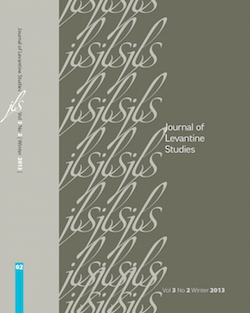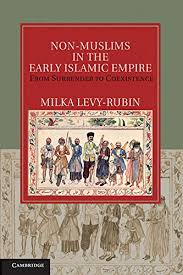-
Add to cartQuick view
The Meaning of “Tolerance,” Which Is the Basis of Modern Civilization
Free!The following translation is a selection from the debate that occurred in 1902 and 1903 between Muhammad ʿAbdu (1849–1905) and Farah Antun (1874–1922), an Ottoman Orthodox Christian intellectual who emigrated from Tripoli to Egypt. The translated section focuses on the question of tolerance and illustrates both the advent of the liberal concept of tolerance in the Arab-Ottoman intellectual sphere and the reception of its ideational content.
Add to cartQuick view -
 Add to cartQuick view
Add to cartQuick viewGender, Religion, and Secularism in the English Mission Hospital of Jerusalem, 1844–1880
Free!This article offers new insights into the operation of the Mission Hospital built in Jerusalem in 1844 by the London Society for Promoting Christianity amongst the Jews (LJS) and the space that was created within it. I argue that the encounter in Jerusalem between Jewish women and the missionaries worked to create a liminal space that was neither religious nor secular, neither Jewish nor Christian, but all (and none) of these at once. I draw on Olwen Hufton’s concept of the “economy of makeshifts” to portray the hospital’s unique space. Based on the existing literature and new evidence, I show that in effect the Mission Hospital served women more than men, and I suggest that the gender composition of the patients allowed the hospital to succeed and helped to shape its operation. After a brief review of the literature, I introduce the LJS and compare its Jerusalem medical mission with contemporary medical institutions in England. I then expand on evidence showing that the Mission Hospital was in fact more of a women’s hospital and suggest why that was the case.
Add to cartQuick view -
Add to cartQuick view
The Assimilation of Spain’s Moriscos: Fiction or Reality?
The proponents of the expulsion of the Moriscos from Spain not only argued that the Moriscos, in the more than one hundred years that had elapsed since their conversion, had not assimilated to the majority Castilian Catholic culture, but that they were incapable of doing so. As a result, the expulsion was both inevitable and necessary. This view has dominated studies on the Moriscos since their expulsion four hundred years ago. In this article I aim to show that some groups of Moriscos had assimilated or were well on the road to assimilation, and that in their case (and that of others too) the expulsion was a human tragedy that was neither inevitable nor necessary.
$5.00Free!Add to cartQuick view -
Add to cartQuick view
Renegades as Crossover Figures: Forgers of the Early Modern Mediterranean
Free!The early modern Mediterranean world would be incomprehensible without taking into account the key roles of the so-called renegades—converts to Islam—who were far more numerous than converts to Christianity. Since renegades rarely wrote or spoke about themselves except under inquisitorial interrogation, and since most texts of the period portrayed them with hostility, the widest range of sources and discursive genres (including literary) in many languages needs to be examined in order to get some sense of who they were. As frontier protagonists, renegades articulated the cultural and religious divide within the Mediterranean. Models proposing split personalities, antagonistic civilizations, or religious discord have done little to resolve the enigma posed by the renegades in all their heterogeneity. This article questions the emphasis on belief and “sincerity” that has always dominated the discussion of renegades, stressing instead their pragmatism, strategic orientation, and acquired capabilities.
Add to cartQuick view -
Add to cartQuick view
Anthony O’Mahony and John Flannery, eds. The Catholic Church in the Contemporary Middle East: Studies for the Synod for the Middle East. London: Melisende, 2010, 352 pp.
Anthony O’Mahony and John Flannery, eds., The Catholic Church in the Contemporary Middle East: Studies for the Synod for the Middle East. London: Melisende, 2010, 352 pp.
$5.00Free!Add to cartQuick view -
Add to cartQuick view
Milka Levy-Rubin, Non-Muslims in the Early Islamic Empire: From Surrender to Coexistence. Cambridge: Cambridge University Press, 2011. 267 pp.
Milka Levy-Rubin, Non-Muslims in the Early Islamic Empire: From Surrender to Coexistence. Cambridge: Cambridge University Press, 2011. 267 pp.
$5.00Free!Add to cartQuick view -
Add to cartQuick view
Back to the Future: The Jerusalem Exhibit at the 1904 St. Louis World’s Fair
Free!The famous St. Louis World’s Fair of 1904 was a vast celebration of the new century and its promise of a future governed by technological and scientific progress. It is not often remembered that in the heart of this paean to modernity stood an enormous and astonishingly life-like replica of the Old City of Jerusalem. Evoking the past rather than the future and transcendence rather than materiality, what was Jerusalem doing in the St. Louis Fair? How did its presence challenge, complicate, or legitimize the popular narratives of modernization with which it was surrounded? Through a description of the fair and the replica—and contra theories that continue to adhere to the secularization thesis and its structuring binaries—this essay is an examination of the preservation and deployment of religious themes and symbols within modernity.
Add to cartQuick view -
Add to cartQuick view
Challenging Religious and Secularist Patriarchy: Islamist Women’s New Activism in Turkey
Free!Since the late 1990s, following the state’s process of de-politicization and exclusion, educated Islamist women in the urban centers of Turkey have been active in raising Muslim women’s identity consciousness and generating solidarity with those affected by the headscarf ban. In the women’s organizations analyzed in this article, Islamist women are carving out a niche to challenge both secularist and Islamist patriarchal practices and discourse. This article contends that organized Islamist women have become significant actors in autonomously mobilizing religious women—in the political parties and in the Islamic movement—in the democratization process. The Islamist women’s learning process has opened them up to dialogue and cooperation—on gender equality and other liberalization issues—with secular women as well as with other oppressed groups. However, their “feminist” stance creates some dilemmas for Islamist and secular women.
Add to cartQuick view
- Home
- About JLS
- Issues
- Vol. 9 No. 1 | Summer 2019
- Vol 8 No 2 Winter 2018
- Vol. 8, No. 1: Summer 2018
- Vol. 7, No. 2: Winter 2017
- Vol. 7, 1: Summer 2017
- Vol. 6, Summer/Winter 2016
- Vol. 5, No. 2 Winter 2015
- Vol. 5, No. 1 Summer 2015
- Vol. 4, No. 2 Winter 2014
- Vol. 4, No. 1 Summer 2014
- Vol. 3, No. 2 Winter 2013
- Vol. 3, No. 1 Summer 2013
- Vol. 2, No. 2 Winter 2012
- Vol. 2, No. 1 Summer 2012
- Vol. 1, No. 2 Winter 2011
- Vol. 1, No. 1 Summer 2011
- Blog
- dock-uments
- Subscribe
- Submit
- Contact




